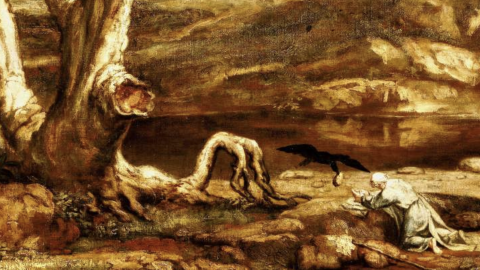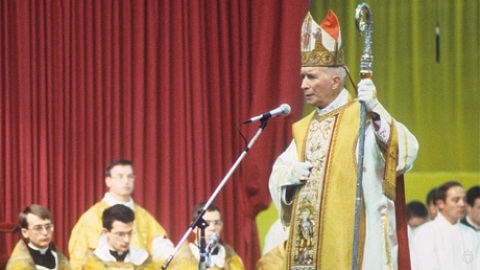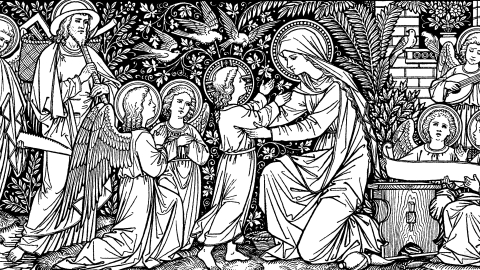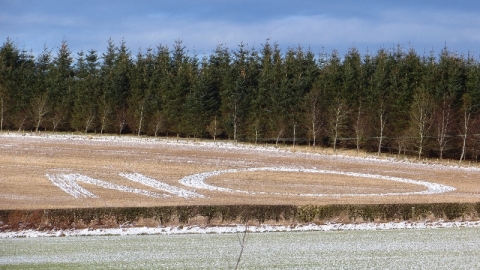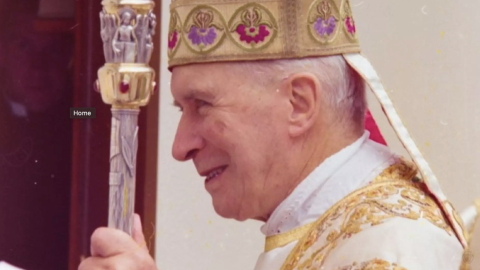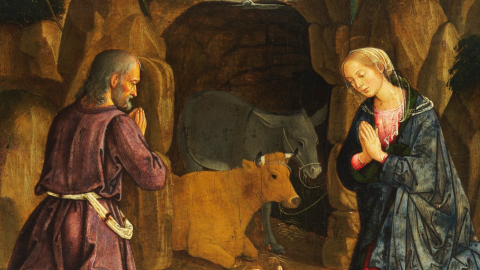Christ the King
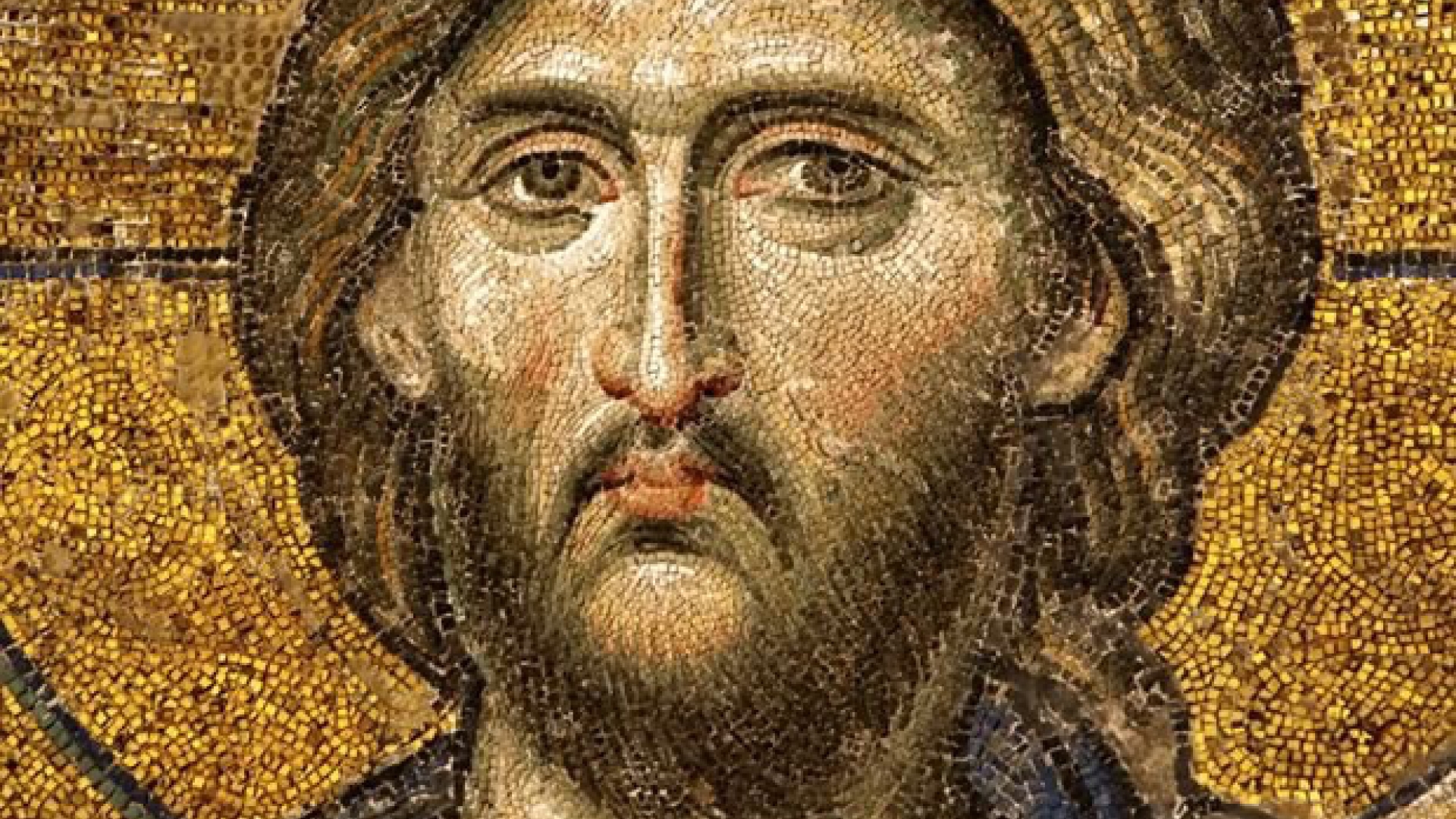
My Dear Brethren,
Lord of the World
About one hundred years ago, Mgr. Robert Hugh Benson wrote a book with the title: Lord of the World. In this book he depicted a future which was a logical extrapolation of the trends that he witnessed at his present time:
- Media manipulation of the masses
- The persecution of Christianity
- The establishment of a new state religion
- Institutionalised euthanasia
- Violence
- The destruction of Rome
- And the coming of the anti-Christ
One of the criticisms made about the book was that did not inspire his readers to hope. Mgr. Benson took this criticism to heart and wrote another book entitled: Dawn Of All. In this book he told a fictional story of how the United Kingdom - both the state and its populace - returned once more to the Faith of their fathers and established Christ as their King. The opening scene is of a grandiose procession in Hyde Park….
But rather than describing these books here (you would enjoy them much more by reading them yourselves), I should like to follow in this latter vein of Mgr. Benson by, instead of lamenting dethroning of Christ the King in what was Christendom, imagining what our lives would be like now in the perfect state. For by so doing this we might be filled with hope on this wonderful feast – hope instead of regret.
Church and State
First of all, imagine, my dear brethren, if Christ was recognised as King of Kings by the state how our country would be different. The goal of our nation state would be the common good which is that temporal order which best disposes its members for eternal salvation. The nation's goal would certainly not be human rights to the positive exclusion of God’s rights which is the same as ruthless individualism.
If Christ were proclaimed King of Kings by the state there would be no need for a permanently sitting legislative body to limit the damage caused by unbridled pursuit of individual interest as we see today. That which would be the guide of the common man would be primarily virtue and only secondarily the law.
A state that had no permanently sitting legislative body would have no need of professional or career politicians who, as experience shows, are more commonly disposed to the individual good rather than the common good.
Would we have a monarchy? Probably, because it is a part of our history, but not necessarily. It would be a monarchy with more power than the present monarch and less power than a Henry VIII. Indeed, the most efficient form of government is benign or benevolent dictatorship. And the most disinterested form of government (in theory) is by hereditary succession.
Would we have a class system? Yes of course. There is necessarily a hierarchy in society because of the differences of privilege and education that both exist and are required in every society. Like an army would be ineffective if all the soldiers were privates or all the soldiers were generals, society would not work if there was not a hierarchy of authority.
Would there be ownership of property if Christ were King? Yes because man needs to provide security for his family.
What would be the Church’s role in the state? The Church would have an indirect power of the state by calling it to order in matters of natural law and encouraging it to create the conditions for following the divinely revealed law: Holy Days of Obligation and other measures to facilitate the pursuance of religious duties.
Free speech? No. Freedom of worship? Private yes. Public no. Faith Schools? Other than the Catholic Schools, no.
Commerce.
If Christ were King our economy would be entirely different. There would be much less advertising, less addictive consumption of goods (credit cards and store cards probably wouldn’t exist). The banks wouldn’t exist as we know them (mutual building societies might) and borrowing, although restricted, would be without usurious interest rates. There would be no inflation as money would be purely a medium of exchange; it would not be created out of nothing.
The massive transport infrastructures necessary for oligarchic monopolies would not exist. We would probably work much closer to home. Local industry would be more diverse and with closer markets. We would spend much less time travelling, less time communicating electronically, more time communicating face to face.
Science & Technology
Science & technology would be completely different. Since the advent of the modern monetary system, intense competition, massive corporate borrowing and heavily funded university and corporate R & D departments, the rate of discovery and invention has been exponential. In a Catholic economy, would the pace of progress be slower? Most probably. Whether this would be a bad thing depends on our answers to the following questions?
- Is it a always a good thing to have a fast rate of discovery and invention?
- Is it a good thing to make or purchase and possess things with imminent obsolescence?
- Are we rendered sad today by not having discovered something we don’t yet know about?
- Or indeed, would we have discovered things in our leisure that industrialised research might never stumble upon?
We take as given our capitalist model of the economy. In it we might feel successful and secure for the moment, but, my dear brethren, despite it being prevalent and powerful, it will fall one day because it is based on confidence and fuelled by a lust for power and pleasure.
The Family
How would our families be different? The fact that you are reading this means that you probably acknowledge Christ as King, but how would our lives be different if Christ was acknowledged as King over the whole of the state? In a truly Catholic state there would be more time, less stress, more humanity in our daily lives:
- The parish church would be around the corner;
- the school would be next to the church.
- All our family and friends would be close by; there would be no nuclear families that we see today.
- We would live in a community; some of us would have servants, some would be the servants of others as we probably would not have so many optimistically-called labour-saving devices.
- We would eat better (no processed food, no microwave ready meals); we would probably grow some of our own food.
- We would exercise more, discuss more, amuse ourselves more.
- We would have more time for spiritual and corporal works of mercy.
- We would have around us a greater example of virtue and be rewarded for the same.
Many more of us would pursue religious vocations as the beauty of the consecrated life would be more visible, more respected and better understood than it is today - even among us. Many of us would frequent the sacraments and devotion more often on account of the ease of access and the example of others.
Why daydream?
Is there any profit in daydreaming about such a society? My dear brethren, yes there is profit, for by knowing how a perfect Christian society might be, we give ourselves a goal to work towards instead of just accepting things as they are. We give ourselves hope in the possibility of a more perfect way of life instead of falling into resignation and even despair. We might not be able to accomplish anything on the national stage or even within our local community today but, by possessing a vision for the future, we can always do something in our families.
What can we do?
In our lives, let us admit, we accept so many things as normal or indifferent to the reign of Christ the King but which, in fact, militate against us achieving that goal. All of us in one way or another, accept the temptations of our modern society:
- We so often accept the temptations of advertising and desire to purchase.
- We so often accept the temptations of our modern forms of entertainment (films, mindless computer games, internet surfing, modern music) which take us away from more wholesome pastimes at best and are an occasion of sin at worst.
- We so often accept the temptations of technology to instant consumption, to idleness or unwholesome pursuits (gadgets and fast food);
- We so often accept the temptations of fashion to at least slovenly dress and at worst to immodesty;
- We so often accept the temptations of convenience to deter us from progressing in virtue.
If we really wish to work towards the social reign of Christ the King, it might be a cliché, but it is no less true, we must start at home. This does not mean we must all go and live on Orkney and grow turnips; it means that we must go and live with the vision of what society should be and what our family life should be and then pray for the graces and exert the will to achieving that end.
On this feast of Christ the King let us dream and pray for those graces. Let us make those resolutions and exercise our will that might bring the daydream of heaven on earth that little bit closer to reality. Let us beg the assistance of the Blessed Virgin Mary, who is our mother, our intercessor and also most conveniently, the Queen of Heaven and Earth too!
+
Rev. Robert Brucciani
27th October 2019
